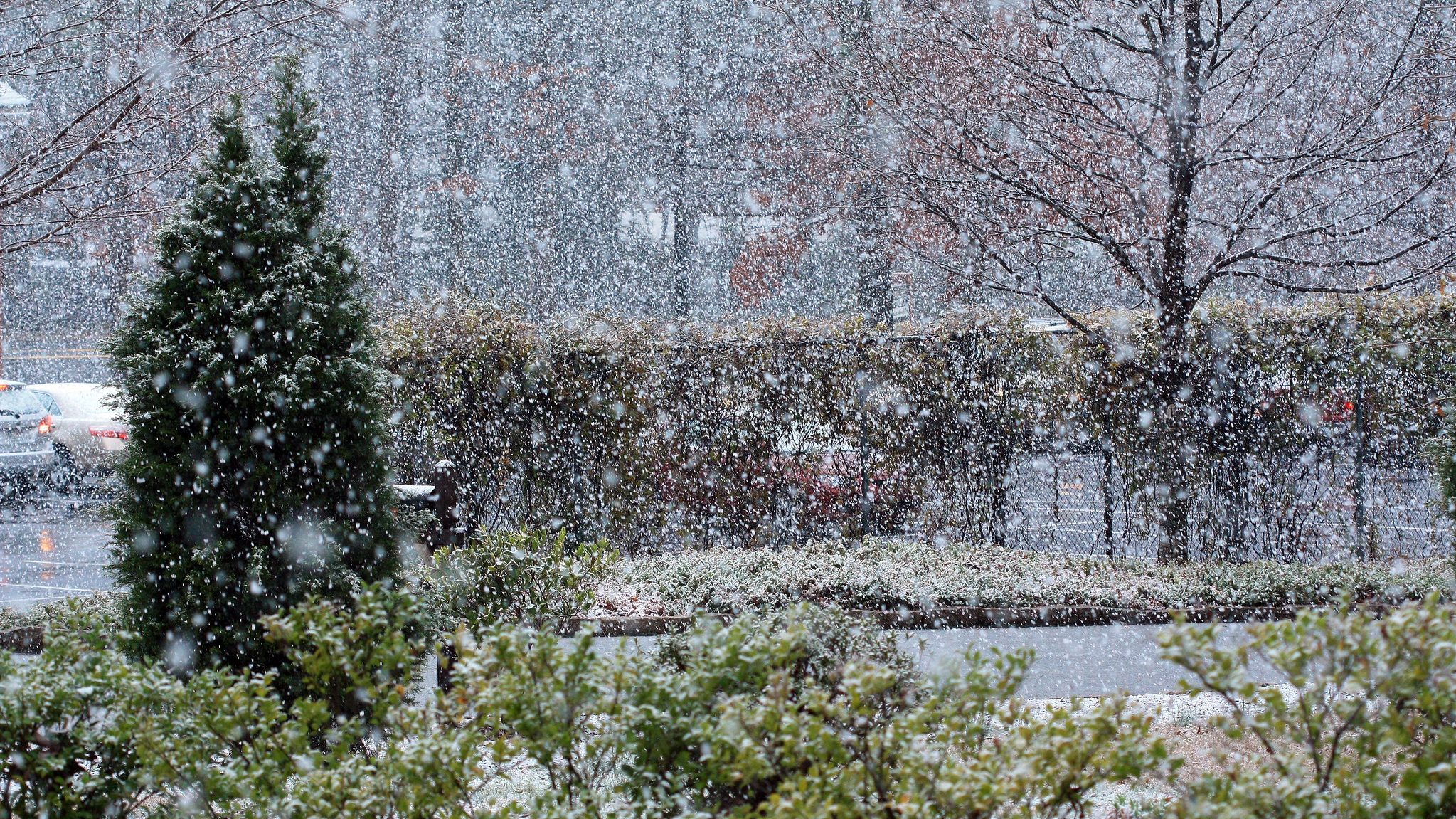December 2019 Newsletter

December 2019 Newsletter
Welcome to the Southeast Climate Adaptation Science Center’s December 2019 Newsletter.
For news and upcoming events related to the Southeast Climate Adaptation Science Center, subscribe to our monthly newsletter.

Southeast Climate Adaptation Science Center News
 Happy holidays from the SE CASC! We hope that you enjoy your holiday season and look forward to reconnecting in the new year/decade.
Happy holidays from the SE CASC! We hope that you enjoy your holiday season and look forward to reconnecting in the new year/decade.
The SE CASC is now accepting Statements of Interest for FY2020 project funding. More information.
We are now accepting nominations from NC State Faculty Affiliates for our 2020-2021 cohort of Global Change Fellows! Learn more.
The fourth webinar in our NCA4 webinar series, Southeast Chapter KM4: Economic and Health Risks for Rural Communities, presented by Kirstin Dow (USC/CISA), has been rescheduled for January 15 from 12pm – 1pm ET. More information or register here.
You can view a recording of our last NCA4 webinar, KM3: Natural Ecosystems will be Transformed, presented by Michael Osland and the Guide to Understanding How Natural Ecosystems will be Transformed in the Southeast.
SE CASC funded project, Communicating Future Sea-Level Rise Scenarios for Gulf Coast National Wildlife Refuge and National Park Lands, produced customized two-page information sheets describing sea level rise scenarios for federal coastal refuges, parks, and reserves across the northern Gulf of Mexico. This included federally-managed lands that are sensitive to sea-level rise in Texas, Louisiana, Alabama, Mississippi, and Florida. Read more.
A summary and recording of the final Global Change Seminar of the semester, Global Change and Adaptation in Agriculture, held December 5, is available. Many thanks to all presenters and participants! Dates for spring Global Change Seminars will be released soon.
SE CASC Annual Report for 2018-19 is posted on our website. Read the report.
New SE CASC project: Impacts of sea level rise and associated salinity changes on at-risk native freshwater mussels and their habitats in Atlantic coastal rivers
Global Change Fellow, Erin Voigt won an award for her research poster at the 2019 North Carolina Coastal Conference; she also received the 2019 joint fellowship from North Carolina Sea Grant and Albemarle-Pamlico National Estuary Partnership. Check out Erin’s Researcher Spotlight.
Check out this USGS Scientist Spotlight on 2018-2019 Global Change Fellow, Bonnie Myers.
Spring 2018 Global Change Fellow, Riley Gallagher, received the Clark Hubbs Award of the American Institute of Fishery Research Biologists. Learn more about Riley’s research.
2015-16 Global Change Fellow, Erica Henry, published Maintaining historic disturbance regimes increases species’ resilience to catastrophic hurricanes in Global Change Biology, describing work on human management for conservation of rare species in disturbance-adapted ecosystems. Faculty Affiliate, Martha Reiskind is a co-author on the paper. Read more.
SE CASC PI, Rob Dunn’s book, Never Home Alone, is a finalist for the AAAS Science Books and Films Prizes for Excellence in Science Books.
Resources
FEATURED RESOURCE
 The eighth edition of the report, Explaining Extreme Events in 2018 from a Climate Perspective, presents 21 new peer-reviewed analyses of extreme weather across five continents and one sea during 2018. It features the research of 121 scientists from 13 countries looking at both historical observations and model simulations to determine whether and by how much climate change may have influenced particular extreme events.
The eighth edition of the report, Explaining Extreme Events in 2018 from a Climate Perspective, presents 21 new peer-reviewed analyses of extreme weather across five continents and one sea during 2018. It features the research of 121 scientists from 13 countries looking at both historical observations and model simulations to determine whether and by how much climate change may have influenced particular extreme events.More information.
Coastal Salinity Index. This USGS resource was developed to characterize coastal drought, monitor changing salinity conditions, and improve understanding of the effects of changing salinities on fresh and saltwater ecosystems, fish habitat, and freshwater availability for municipal and industrial use. Learn more.
Conserving Shorebirds in the Atlantic Flyway. This story map presents how partners are addressing threats to shorebirds and working to meet the Atlantic Flyway Shorebird Initiative’s conservation goal of increasing focal shorebird populations 10% by 2025. Learn more.
Fire Frequency Tool 2.0. This ArcGIS tool was developed to evaluate a fire’s cumulative impact in order to facilitate decision-making in targeting successive prescribed fire applications. More information.
Interactive Summary Of Interventions To Increase The Persistence And Resilience Of Coral Reefs. This infographic provides detailed information and access to the National Academy of Sciences review of the state of science on genetic, ecological, and environmental interventions meant to enhance the persistence and resilience of coral reefs. More information.
Climate Adaptation for DoD Natural Resource Managers. This collection of resources was created to guide Department of Defense installation managers in incorporating climate adaptation strategies into Integrated Natural Resources Management Plans. Learn more.
Climate Heritage Network. This network of agencies, organizations, and businesses seeks to ensure that cultural heritage is part of climate change and climate action discussions throughout the world. Queen Quet, Chieftess of the Gullah/Geechee Nation, introduced the Network’s Action Plan at the United Nations Conference of Parties 25. Learn more.
Sea Level Rise and Critical Infrastructure. Expanding on NOAA’s Sea Level Rise Viewer, this web application displays critical infrastructure assets affected by sea level rise using an interactive slider that represents water levels based on data and services from NOAA’s Digital Coast. Learn more.
In the Media
One city’s plan to combat climate change: Bulldoze homes, rebuild paradise. Washington Post
To save Everglades, guardians fight time – and climate. AP News
As hurricane season ends, now is the time to take local action to rebuild and recover (commentary). Mongabay
2019 Wraps Up The Hottest Decade In Recorded Human History. Forbes
Historic Southeastern Towns Endured Wars, Storms. What About Sea Rise? WUNC
Florida Keys Deliver a Hard Message: As Seas Rise, Some Places Can’t Be Saved. NY Times
Study: Gulf storms will become more potent. HoumaToday

Notable Publications
Evaluating the performance of past climate model projections. Plain Language Summary: Climate models provide an important way to understand future changes in the Earth’s climate. In this paper we undertake a thorough evaluation of the performance of various climate models published between the early 1970s and the late 2000s. Specifically, we look at how well models project global warming in the years after they were published by comparing them to observed temperature changes. Model projections rely on two things to accurately match observations: accurate modeling of climate physics, and accurate assumptions around future emissions of CO2 and other factors affecting the climate. The best physics‐based model will still be inaccurate if it is driven by future changes in emissions that differ from reality. To account for this, we look at how the relationship between temperature and atmospheric CO2 (and other climate drivers) differs between models and observations. We find that climate models published over the past five decades were generally quite accurate in predicting global warming in the years after publication, particularly when accounting for differences between modeled and actual changes in atmospheric CO2 and other climate drivers. This research should help resolve public confusion around the performance of past climate modeling efforts, and increases our confidence that models are accurately projecting global warming. Link to article.
Advancing Coastal Risk Reduction Science and Implementation by Accounting for Climate, Ecosystems, and People. In an era of rising seas, reliance on seawalls and other methods of hardening shorelines is unsustainable given the high costs and impacts on natural ecosystems. Nature-based approaches such as protecting and restoring coral reefs and coral forests offer lower cost, sustainable alternatives for protecting shorelines. Researchers modeled and assessed risk reduction provided by coral reefs, mangroves, and seagrass along the entire coast of The Bahamas, under current and future climate scenarios. Results indicated that the island’s population is at an increased risk of coastal hazards with sea level rise and the risk triples if natural ecosystems are lost or degraded. The ecosystem-based risk reduction varies across islands for ecological, physical, and social variables. Link to article.
Extinction filters mediate the global effects of habitat fragmentation on animals. Loss of habitat is known to be the most important factor causing species loss and declines in biodiversity globally. This study undertook an analysis of global datasets of 4489 animal species to determine the importance of habitat fragmentation, defined as the spatial arrangement of remaining habitat, on species composition of ecological communities. They found that the proportion of fragmentation-sensitive species was nearly three times as high in regions with low rates of historical disturbance compared with regions with high rates of disturbance such as fires, glaciation, hurricanes, and deforestation. High-latitude areas historically experienced more disturbance and supported more resilient species, suggesting that extinction has already removed fragmentation-sensitive species. Authors identified conservation efforts to decrease fragmentation in the tropics as particularly important. Link to article.
Shared morphological consequences of global warming in North American migratory birds. Researchers measured a series of 70,716 individual specimens of 52 North American migratory bird species spanning four decades and showed that increasing annual summer temperature over the 40-year period correlated with consistent warming-induced reductions in body size across the diverse taxa. Over the same period, wing length consistently increased across species. They conclude that body size reduction is a general response to climate change, as is a shift in body shape. Increasing wing length may be a compensatory adaptation to maintain migration as reductions in body size have increased the metabolic cost of flight. Link to article.
The Future of Reef Ecosystems in the Gulf of Mexico: Insights From Coupled Climate Model Simulations and Ancient Hot-House Reefs. In this study, researchers analyzed the RCP8.5 ensemble of the Community Earth System Model v1.2 to identify monthly-to-decadal trends in the Gulf of Mexico sea surface temperature (SST). Additionally, they assessed projected changes in ocean pH, carbonate saturation state, and salinity in the same model simulations to determine that the combined impacts of higher temperatures and changes in ocean acidification will have severe degrading effects on coral reef systems in the Gulf of Mexico by 2100. The SST is expected to increase by 2.5–3°C, though reef systems do not show signs of an ability to adapt to these higher temperatures. For additional context, researchers also looked at exceptionally warm “hyperthermal” events in Earth’s past which caused extinctions, reef collapse, and significant ecological changes. However, they mention that the reefs were able to survive these events on an evolutionary timescale. Finally, this study reviewed the literature on the adaptive capacity of the Gulf of Mexico’s coral reefs and concluded that the only solution for long-term conservation and recovery is the rapid decrease of anthropogenic greenhouse gas emissions. Link to article.

Tribal News
Good Fire. This podcast covers the ways that “good fire,” or prescribed fire is used by indigenous groups. While focused primarily on Indigenous People in Canada, the podcast also covers other areas and highlights many issues relevant to the Southeast. Learn more.
BIA Tribal Resilience Program. Please join us for an informational webinar describing the 2020 Solicitation on Thursday, January 9, 2020 from 11:00am-12:30pm (Mountain Time). It will be hosted by the Institute for Tribal Environmental Professionals. Please register here. ITEP will provide a link to the recorded webinar within a few days of the webinar for those unable to attend.
Save the Date for 2020 Rivercane Gathering. March 12-14, 2020, Tahlequah, OK. The goal of the Rivercane Gathering is to bring together tribes, native artisans, traditional knowledge holders, scientists, land managers and other stakeholders to share in two-way learning about the current state of knowledge for rivercane in the southern United States. More information.
The Institute for Tribal and Environmental Professionals will host the inaugural National Tribal & Indigenous Climate Conference from August 31 to September 4, 2020. Location is to be announced soon. More information.
The 2019-2020 Native American Research Assistantship program is now open through January 19th. More information.

Regional Partner News
State Climate Office of North Carolina: Breaking Down the State Climate Office’s 2019-20 Winter Outlook
National Wildlife Federation: Historic, Bipartisan Wildlife Funding Bill Moves Forward
Atlantic Coast Joint Venture: Save the Salt Marsh
Gulf of Mexico Alliance: Update: Gulf Star Water Watch Programs
Association of Fish and Wildlife Agencies: Fish and Wildlife Relevancy Roadmap
South Atlantic Landscape Conservation Cooperative: The Nature Conservancy’s Resilient Coastal Sites for Conservation in the South Atlantic

Webinars
Jan 15 | 12pm – 1pm | NCA4 Webinar Series: Economic and Health Risks for Rural Communities

Upcoming Events
Find more upcoming events in our calendar.
April 4 & April 18 | ComSciCon-Triangle workshop | RTI International
At NC State
April 28-29 | State Energy Conference | McKimmon Conference and Training Center

Opportunities
Student Announcements
The National CASC is now accepting applications for the Science to Action Fellowship. Interested graduate students may apply here by Jan. 31.
NPS Future Park Leaders of Emerging Change program supports paid internships for undergraduate or graduate students that focus on emergent management issues arising from global drivers of environmental change. Applications are due Jan. 24. More information.
NOAA is accepting applications for the NMFS/National Sea Grant Graduate Fellowship. Interested doctoral students can apply here by Jan. 30.
Hiring Announcements
Applications are still being accepted for the NOAA Coastal Management Fellowship. Postgraduate students can apply here by Jan. 17.
Applications are now being accepted for the Gund Postdoctoral Fellowship. Interested postdoctoral scholars may apply here by Feb. 15.
Research Grants
The EPA is accepting applications for the Environmental Education grant program. Apply here by Jan. 6.
NOAA’s Coastal and Marine Habitat Restoration Grants for community-based restoration projects has an application deadline for pre-proposals of Jan. 8.
Appalachian Highlands Network Research and Education Program supports scientific research, public education, and outreach leading to enhanced understanding and management of resources of Great Smoky Mountains National Park. Apply by Jan. 10, by contacting Paul E. Super, Research Coordinator, paul_super@nps.gov.
The 2020 Readiness and Environmental Protection Integration (REPI) Program Challenge application period is now open. Submit pre-proposals here by Jan. 24. More information.
The National Fish and Wildlife Foundation is accepting proposals for the 2020 Longleaf Stewardship Fund. Apply here by Feb. 6.
- Categories:

